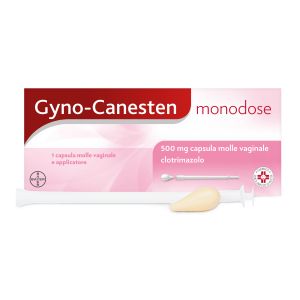Ship in Europe, Find out rates!
Gyno-canesten 500mg single dose for candida vaginal capsule and applicator

- box Delivery in Italy in 24/48 and free returns
- star3.000+ positive reviews
- dropboxOver 60,000 products in the catalog
Therapeutic indications
Treatment of infections of the vagina and external female genital organs caused by microorganisms sensitive to clotrimazole such as fungi (usually Candida ).
Dosage
Posology Adults and adolescents from 16 years of age One vaginal soft capsule inserted deep into the vagina as a single dose in the evening. If there is no improvement after 7 days, the patient should see a doctor. Adolescents 12-15 years of age In adolescents under 16 years of age, Gyno-Canesten single-dose soft vaginal capsule should only be used after consultation with your doctor. When prescribed in this population (in post-menarche patients), the recommended posology is the same as for adults. Pediatric population The safety and efficacy in girls below 12 years of age have not been established. Method of administration One vaginal soft capsule inserted deep into the vagina as a single dose in the evening. The soft vaginal capsule is inserted as deeply as possible into the vagina with the applicator included in the package. During pregnancy, the soft vaginal capsule must be inserted into the vagina with a finger, without the applicator, to avoid injury to the uterine cervix. Treatment with Gyno-Canesten single-dose 500 mg vaginal soft capsule should not be used during the menstrual period. Treatment must be finished before menstruation begins. The partner should undergo local treatment if they have symptoms such as itching, inflammation.
Overdose
There is no risk of acute intoxication as it is unlikely to occur after a single vaginal application of an overdose or after inadvertent oral ingestion. There is no specific antidote. The following adverse reactions have been reported during acute clotrimazole overdose: abdominal pain, pain in the upper abdomen, diarrhea, malaise, nausea and vomiting.
Contraindications
Hypersensitivity to clotrimazole or to any of the excipients listed in section 6.1.
Side effects
| System and organ classification | Common (≥1 / 100 to <1/10) | Uncommon (≥1 / 1000 to <1/100) | Rare (≥1 / 10,000 to <1/1000) |
| Gastrointestinal disorders | abdominal pain | ||
| Disorders of the immune system | allergic reactions | ||
| Reproductive system and breast disorders | burning | Itching (itching sensation) erythema / irritation | edema rash of the skin vaginal haemorrhage |
Pregnancy and breastfeeding
Pregnancy There are limited data from the use of clotrimazole in pregnant women. Animal studies do not indicate direct or indirect harmful effects in terms of reproductive toxicity (see section 5.3). As a precaution, it is preferable to avoid the use of clotrimazole during the first trimester of pregnancy. The applicator should not be used during pregnancy (see section 4.2). If the treatment is considered necessary during pregnancy, it should be carried out with vaginal soft capsules of clotrimazole as it is possible to insert them without an applicator. The birth canal should be kept clean especially during the last 4-6 weeks of pregnancy. Breastfeeding During local treatment only minimal amounts of clotrimazole are absorbed into the bloodstream, but since clinical studies have not established the excretion of this drug in breast milk, it is recommended as a precaution to discontinue breastfeeding during treatment. Fertility No human studies on the effects of clotrimazole on fertility have been conducted. However, animal studies have shown no effect of the drug on fertility.
Special warnings
The patient should contact her doctor if: · this is the first time she has had a vaginal infection; Have recurrent infections, at least four infections in the previous year; Have a fever (≥ 38 ° C); Have pain in the lower abdomen, back pain; You have foul-smelling vaginal discharge; Have nausea; Have vaginal bleeding and / or have shoulder pain at the same time. Absorbents, vaginal douches, spermicides or other products for vaginal use should not be used in conjunction with this product. Sexual intercourse should be avoided while using Gyno-Canesten single-dose 500 mg vaginal soft capsule, as the infection could be passed on to the partner. The effectiveness and reliability of latex contraceptives such as condoms and diaphragms can be reduced. The soft vaginal capsules should not be swallowed.
Expiry and Retention
This medicinal product does not require any special storage conditions.
Active principles
One vaginal soft capsule contains 500 mg of clotrimazole. For the full list of excipients, see section 6.1
Excipients
Composition of the filling material: White soft paraffin Liquid paraffin Dry gelatin shell composition: Gelatin Glycerol Purified water Titanium dioxide (E171) Quinoline yellow (E104) Sunset yellow (E110) Lecithin (E322) Medium chain triglycerides


